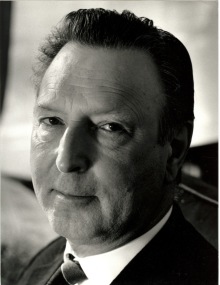Tudor Gates dies at 76

Writer and producer Tudor Gates, a leading lay member of BECTU, has died at home in Kent.
Born in 1930, he had played a major role for several decades in the union and its predecessors as an active member, and was still an elected member of the National Executive Committee at the time of his death.
By 1991, when BECTU was founded, he had been President of the ACTT for several years, and went on to serve as Vice-President of the new union until 2004.
He was also, in his capacity as a working writer, an energetic and respected member of the union's Writers, Producers, and Directors Branch, and devoted much energy to organising masterclasses and other events for fellow members.
Tudor represented BECTU on the board of FT2, a film industry training body which enables young workers to find training and jobs in the sector.
His support for unions in the industry began in the early 1950s when he was working in stage management in repertory theatre, and spending his free time writing scripts.
One of his early TV plays, The Guv'nor, broadcast by Rediffusion Television in 1956, was the springboard for him to abandon theatre tours and concentrate on writing for a living.
He produced a succession of TV and film screenplays, as well as stage scripts, for the next forty years. In 1968 he collaborated on the screenplay for Barbarella, an iconic cult film, which he followed in 1970 with the script for one of Hammer's few high-budget horror films, The Vampire Lovers, which also became a classic.
His TV scripts included episodes of mainstay popular dramas through the 60s and 70s, including The Avengers, The Saint, and The Sweeney. Among his other written output were stage plays that enjoyed lengthy West End runs, including Who Killed Agatha Christie, and among the books he produced was the writers' handbook The Craft of Screenwriting.
Throughout this period Tudor was an enthusiastic union member who, over his career, belonged to Natke, the ACTT, and latterly BECTU, a union created by a process of amalgamation in which he played an instrumental role as ACTT President.
Unlike many of his active union colleagues Tudor was never a supporter of the Labour Party. His politics were instead those of an old-style Liberal, a party for whom he once stood as a General Election candidate.
Within the union his fierce belief in individual rights, and suspicion of (in his view) left-leaning institutions in the labour movement, often led to clashes with other members and union officials.
He won few friends by initiating at least two legal complaints against the union over its internal procedures, in the process invoking controversial labour legislation introduced by the 1979-1997 Tory government.
One successful complaint in 2002 led to a change in election procedures which introduced a one-member one-vote process when selecting the union's President.
Having secured a plebicite for election of the union's highest lay office, Tudor stood as a candidate in the ensuing ballot, losing by only a narrow margin to the incumbent Tony Lennon.
However deep his differences with colleagues might have been, he seldom fell out with them on a personal level though, and routinely topped the poll when London Freelance members were electing their representatives on the union's ruling NEC.
Until the year before his death, when a bout of ill-health, particularly heart problems, led to long spells in hospital, Tudor had maintained his active involvement in union affairs, and was still writing and producing for the stage.
Film buffs will remember him as a significant figure who chalked up an admirable list of credits in a period when the British film industry came close to competing with Hollywood, using local actors, writers, and crews.
As a trade unionist, Tudor was always an indefatigable, occasionally iconoclastic, activist, who fought for unions to remain a key part of civil society, and never allowed the leadership to forget that they were in office solely and exclusively to represent their members.
Amended 16 January 2007
